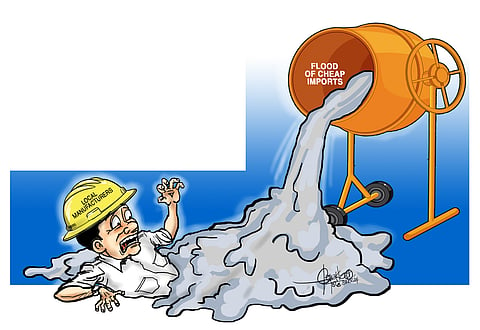
- NEWS
- the EDIT
- COMMENTARY
- BUSINESS
- LIFE
- SHOW
- ACTION
- GLOBAL GOALS
- SNAPS
- DYARYO TIRADA
- MORE

The dumping of foreign products has long been a scourge on the economy, as it undermines the initiative of local manufacturers and leads to the decline of domestic industries and job losses for Filipinos.
The influx of cheap imports, which causes dislocation for local businesses, has been a recurring problem that can be effectively addressed through strong government leadership.
Thus, the Department of Trade and Industry (DTI) has taken a step in the right direction by initiating an investigation into the surge of cement imports from Vietnam.
In October 2022, the local cement sector achieved a victory against suspected dumped cement after the TC imposed a five-year punitive tariff on certain brands from Vietnam that were identified as the most dumped.
However, since Vietnam is experiencing a surplus in cement production, the incidents of dumping have increased beyond the brands that the TC had pinpointed.
Two years after the imposition of tariff protection, the situation has not improved, as local cement makers continue to face cut-throat competition from imports.
Roque’s commitment to fully implement the recently enacted Tatak Pinoy Act and her dedication to supporting local industries have instilled confidence in local producers regarding a more robust effort to protect them from unfair practices.
Industry players believe that, with government assistance, local manufacturers can fulfill their mission of stabilizing employment, bolstering local industries and maintaining essential construction standards.
Left to its own devices, the industry risks being overwhelmed by cheap imports, which would ultimately weaken the economy.
According to industry figures, the influx of imported cement is harming the local industry, as domestic output of up to 50 million tons annually exceeds the estimated national demand of around 35 million tons.
The cement industry is one of the few sectors of the economy where nearly all raw materials are sourced locally.
Local materials are of far superior quality compared to the dumped products from Vietnam, thanks to Filipino expertise that adapts the local product to the nation’s infrastructure needs.
As with other industries, cement manufacturers need to achieve economies of scale for cost efficiency. At the current utilization rate of 55 to 60 percent, production costs remain high, forcing some plants to temporarily shut down.
The industry is optimistic about its competitive potential and is focusing on future investments in energy-saving technologies to improve competitiveness.
The key to the Tatak Pinoy initiative is ensuring that Philippine-made cement adheres to Philippine National Standards, which are aligned with the country’s climate, geological, and seismic conditions.
Therefore, manufacturers have commended the DTI’s move to promptly investigate the effects of imports on the local industry.
Safeguard duties are essential tools to protect the local industry, which remains vulnerable to imports, especially at a time when energy prices are high.
Cement manufacturing is among the most energy-intensive industries.
The recurring problem of dumping clearly indicates that the measures undertaken have not been sufficient to effectively shield the local economy from the onslaught of dumped products.
Roque’s actions have set the tone for the Marcos administration’s whole-of-nation approach to ensuring the prosperity of local producers amid growing global competition.
